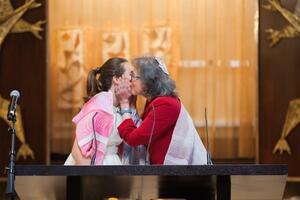Rabbi Laura Geller: Torah of Jewish Feminism
I wasn’t always easily identifiable as the Jewish feminist activist I am today. In fact, I was a Hebrew school drop-out. My mother had to break the news to my grandparents, two incredibly philanthropic Jews who had been looking forward to raising grandchildren with the same values. If I was any indication as the oldest grandchild, it was looking like they were going to end up with a family of atheists … but then I discovered Rabbi Laura Geller.
In 1994 Rabbi Geller became the first female rabbi of a major metropolitan synagogue, my synagogue. Temple Emanuel took a chance by choosing her, and thank G-d they did. She transformed a small community of Beverly Hills Jews into a hub of social justice and contemplative prayer that has changed many lives, including mine.
I’d been dragged to countless High Holy Day services where sermons went in one ear and out the other. Hers were the only ones that actually kept me engaged, though I’d never admit it to my parents. After a long and winding road of alternative Hebrew education, I got the opportunity to work one-on-one with Rabbi Geller in preparation for my bat mitzvah. It was during these intimate sessions that I realized exactly how big of a deal she was and exactly how much I aspired to be just like her.
We picked apart my Torah portion and put it all back together; I couldn’t get over how perfectly the story of Terumah fit my struggling yet curious Jewish identity. Every conversation I’ve had with Rabbi Geller since then has challenged me in the most irresistible way. And clearly, I’m not the only one who feels this way.
As I grew into both my Jewish and feminist identities, Rabbi Geller helped bridge the gap between them. Over the years, she’s taken me on as a kind of apprentice. I’ve sat countless times in her office and living room chatting over tea, politics, and the future of Jewish feminism, so when I asked if I could interview her for a project with JWA, she kind of chuckled. She was right–it just ended up being yet another conversation between us about the things we both treasure most. Once again I found myself entranced by stories that were still new to me, though I’ve known her my whole life.
Decades before the term “intersectionality” was officially coined, Rabbi Geller was writing it into the Torah of her life as well as the lives of her family, friends, colleagues, and congregations. In what she refers to as her first sermon, her valedictory address given at her graduation from Brown University in 1971, she said, “The women’s movement, the black movement, and the antiwar movement are all part of the same struggle–the struggle to reshape our society so as to make people whole.”
When I pointed out this incredibly timely quote to her, she told me she didn’t have a clue what she was talking about in 1971 in terms of intersectionality and that she hadn’t even heard the word as of two years ago. Regardless, she was practicing the concept and preaching it to anyone who would listen. To this day she is most passionate about exploring intersectional issues. We discussed women and gun control, the Torah and abortion, anti-Semitism and the Women’s March, you name it. And her solution to all of it? A simple conversation. She said to me with conviction, “I want to be there around the table, and I want to say, ‘This is why this is painful to me, but tell me what it means to you.’ If I’m not around the table, then we’ve lost.”
She’s been saying “Guns are the problem, not the solution” since her 1991 response to the beating of Rodney King. With the help of Betty Friedan, she started Women Against Gun Violence 25 years ago. She’s been defending women’s reproductive rights since the 1960s, yet it’s 2018 and all these problems are more relevant than ever. When I asked her whether in this day and age it’s easier to be an activist or to be complacent in the society we live in, she told me, “Had you asked me this question three months ago, the answer might be different.” She would’ve voted for “complacent.” The Parkland shooting and subsequent action by teen activists has changed her mind; we both agree the tragedy has sparked not just a moment, but a movement.
Rabbi Geller is more hopeful now than ever that my generation will be the one to turn this all around. I am too, thanks to all I’ve learned from her. She told me, “The interaction between the Torah of my life and the Torah of tradition is the essence of my Judaism.” While so many Jews learn from the Torah of tradition, I’ve learned most about myself and my Judaism from the Torah of Rabbi Geller’s 42 years in the rabbinate. She is the essence of my Judaism, and having the opportunity to share part of her incredible life story in my own words is truly a privilege. I hope to preserve and honor the legacy she has created within both Jewish and feminist communities, as I mature into the person she has helped me become.
This piece was written as part of JWA’s Rising Voices Fellowship.








Wow! I could really feel your passion as I read this piece, Dorrit! Mazel Tov!